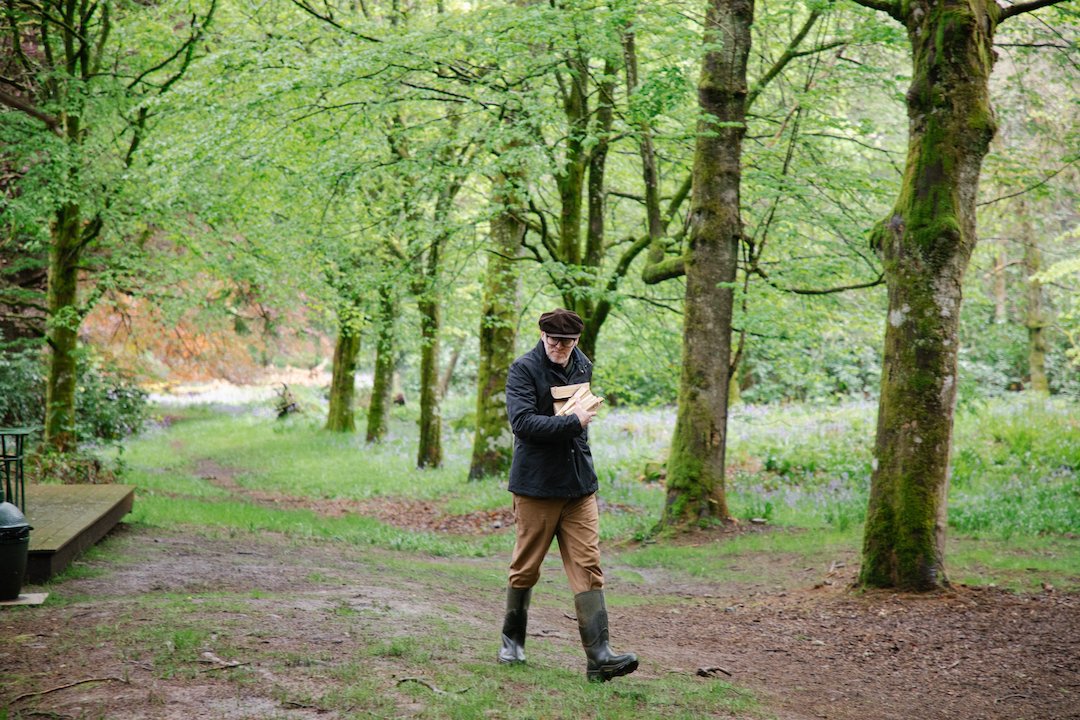Kirstie Allsopp on How to Save The High Street
Having co-presented Britain’s most loved property show, Location, Location, Location, for almost twenty years, there is arguably no one who knows the British high streets quite like Kirstie Allsopp.
Once a central part of any community, the high street was a bustling place to meet, to eat, to drink and to shop and to live. Kirstie discusses the issues with the high street today and what she would do to save them.
An Interview by CHarlie GladstoneSome Good Ideas: What would you do to save our high streets, which are obviously in complete crisis?
Kirstie Allsopp: Well I think the first thing is, there would be penalties for shops that didn’t rent out their residential space, because high streets need human beings living above them, in them, among them.
SGI: Is that a real problem?
KA: It is a real problem. There is a lot of empty space above shops, which is really just used for storage. And the shops tend to not want it to be residential, because, if someone overflows a bath, insurance becomes an issue. But there are things you can do to get around that. It is really important that as many people as possible live on the high street. So that would be the first thing, you would incentivise or penalise, whichever worked best, space above shops.
SGI: You don’t think it’s because people don’t want to live on the high street?
KA: No, I believe people do want to live on the high street, it’s a very convenient place to live. It really is. Particularly if you are a little older. A lot of older people who aren’t so comfortable with driving are very comfortable living in a place where there are other people coming and going, where they can just nip out to the shops; particularly in rural areas where transport is so limited. People shy away from talking about Prince Charles’ development outside of Dorchester, Poundbury, but it works. It probably works in a very middle-class way and it probably wouldn’t transpose all across the country, but the fact is that Poundbury is based very much on the premise of mixed use.
“We should build above every supermarket in the country.”
Kirstie AllsoppSGI: Work, play, sleep.
KA: Exactly. And I think that is very important. I also think, by the same token actually, we should build above every supermarket in the country. I think the idea of single-story retail units is extraordinary. We have all the transport links, all the infrastructure, everything. How can there be a Tesco’s outside Honiton which doesn’t have two blocks of flats above it? It’s absurd! Sometimes when you talk about it people say, “well what about the reversing trucks at night?” Switch off the noise after a certain time at night! Noise is not a reason for not doing it. I think it is extraordinary that we have built any structure in the last 20 years without living accommodation above it because it’s not like the need for more housing has suddenly come out of the blue, we have known for many, many years. If you go to Norway, for example, and there is any out of town retail unit, it will have two blocks of, often wooden built, well-insulated, very attractive looking accommodation, over the top of it. It’s ideal, it’s central, it’s close to schools, hospitals, the doctors, the vets. I don’t know why it’s not a thing in the U.K. If you were to drive out of London towards Oxford on the M40 there are sways of cinemas and garages, and retail units, all of them single story.
SGI: With amazing access to car parking, road access, electricity, sewage system.
KA: Everything, everything that you would need.
My second thing for the high street would be that you lower the rates for single owner businesses. If you are just one shop, or maybe two or three shops, you pay fewer rates than the big conglomerates.
SGI: Do you not feel that the whole rating system needs root and branch work?
KA: Yes, it does but my experience within the property sector is that root and branch doesn’t happen. One of the things that I spent many years trying to do is to reform the way in which we purchase houses. Our conveyancing system is shot to pieces, it just doesn’t work. The whole exchange and completion system is going wrong and there are very simple ways you could change that but it never happens, because people come up with these grand suggestions and nobody can be bothered to implement them.
“If you are a business who only has one shop, or two, you get a discount on your rates. Simple as that.”
Kirstie AllsoppActually, if you just say for now, for the time being, next year, if you are a business who only has one shop, or two, you get a discount on your rates. Simple as that. We know they have been able to discount for charity shops, so why should it be so difficult to discount for one or two businesses? You just say, “I only have one shop, therefore I get this discount”, end of story. Perhaps have a word with some of the charities about their discount, how many Oxfam shops are there? I don’t want to knock Oxfam, or particularly target anyone or any one business, but those are big, BIG, businesses. Yes, they are charities, but they benefit enormously from the discount and they do alter the nature of our high streets, and we have got to address that.
SGI: They alter the balance I think. We need to accept them but rebalance other things as a consequence.
KA: Yes absolutely. So that would be my second thing, after more residential, discounted rates for single owner businesses. The third thing is that I would change Sunday trading. So that I would say again, if you are a business that has just one or two stores, you are allowed to be open on Sunday with the extended hours that you would like.
SGI: Because you offer a benefit to your community.
KA: Because you offer a benefit to your community. So any village shop or a local fruit seller or gift shop, or coffee shop, anything like that, a single owner or who has one or two shops around the area, but not the big stores. So that if you want to buy a plug on a Sunday, you can, but you can buy from your local electrician store.
SGI: In France, it only takes one day of the week to keep the high street going, and that is the market day. People come in, away from the supermarkets and go to the pharmacy and local florist.
KA: There are those local shops and they tend to not be open on Sundays because they struggle with the Sunday opening laws. The Sunday opening laws were designed to protect people, and people’s family time and working time. But they don’t really do that anymore.
SGI: Do you think the government would ever tackle that, Kirstie?
KA: A lot of people would say that failure to realise how many people have to work on a Sunday is a failure to understand peoples’ real lives. There are shift-workers and all sorts of people who might want to do things on a Sunday which involve retail. But we have to accept that we now have internet retail, which we didn’t before. One of the greatest joys of making Location, Location, Location is that I get to go up and down the country and at any time I get off, I seek small independent shops. The talent of a good buyer means you will go to an independent shop and you will see something you have never seen before. We have got into the habit of thinking anything can be found on the internet and I’m sure it can, but that pushes aside the work of a good buyer. Many years ago, I bought a Swifty scooter in Pedlars. I saw it in Pedlars and I bought it in Pedlars, you had done the research, you had discovered Swifty, and that’s why I bought it. You don’t sell them anymore; I buy them directly from Swifty. That has been the case with so many things in my life.
“You know in Italy -I know this is a generalisation- but you go to the high street and you see old people in the coffee shops, gathering, chatting, spending their day, playing the equivalent of chess. It provides a community resource for the whole area.”
Kirstie AllsoppSGI: You’re right of course, you could survive as a greengrocer or a butcher if you weren’t constantly outcompeted. If they had at least one day a week where everyone who wanted to go shopping could go to them.
KA: Yes, and they would go in and they would see those things. We were talking about the service station on the M6, Tebay. I have never been but my sister buys me lovely presents from there when she comes down south, and it’s obviously got really talented buyers that find individual pieces.
SGI: Yes they have really talented buyers, it is really professionally run, that is the distinction of it. They have done something that people are crying out for there, by creating an amazing service station.
KA: I’m fed up with seeing the same thing in every single place! It has become like airports, you know, you go through an airport and you can’t even find the regional section.
SGI: Yes!
KA: No airport anymore has any individuality, even in Istanbul, where there is this huge new airport, it’s all the same thing. All the same confectionary, all the same alcohol, all the same face cream, you never find anything different. Years ago, you would go to an airport, be it in Nairobi, or the airport in Istanbul, or the airport in Copenhagen, and they would sell totally different things. That is just not the case anymore. I think people are desperate.
SGI: Again, I think it’s the curse of the big business. No one stands up and says, well it’s all very well having Gucci, Prada, Fiorucci in Heathrow, but actually for every one of those we should have an independent one as well.
KA: But you can do that on the high street. You can do that because you are benefiting the high street, because the high street needs to be rescued, for all our benefit. Or where are we going to live when we are older? You know in Italy -I know this is a generalisation- but you go to the high street and you see old people in the coffee shops, gathering, chatting, spending their day, playing the equivalent of chess. It provides a community resource for the whole area. I am sure Italians would say that it’s dying out, that how it used to be 20 years ago is not necessarily the case now. But if we don’t promote our high street, if we don’t promote independent shops, the high-street will die and the community around the high street will die. But also, one day we will want to buy a bar of chocolate and it will cost a tenner, because it can cost a tenner, because there are no other bars of chocolate left! And there is no other place to buy a bar of chocolate. They will have us over a barrel.




